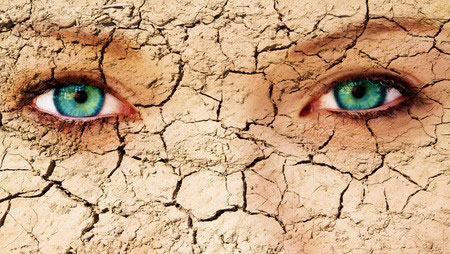Do you know the difference between dehydrated skin and dry skin?
by Lisa Young – Salon Director
 Is your skin thirsty from the inside out ?
Is your skin thirsty from the inside out ?
The look and the feel of your skin can guide you in the wrong direction when it comes to selecting the correct skin care if you don’t understand what your skin is telling you and what it needs.
If you’ve ever had your skin analysed by a skin care professional you have probably heard the terms dry or dehydrated.
There is a difference between dehydrated skin and dry skin.
So read on to find out the difference between them to help ensure you choose the best products and optimum skin care routine to suit your skin’s individual needs.
So what is dry skin ?
Dry skin is where the skin is not producing oil or sebum an NMF (natural moisturising factor). Your skin relies on this oil or sebum to hold moisture in the skin (almost like an invisible waterproof protection known as skin barrier function).
Without oil or sebum your skin will be rough and flaky and wrinkles are more pronounced. Dry skin can also lead to a damaged barrier function, which results in increased sensitivity and inflamed skin. It’s like bricks and mortar, where the lipids and oils are the cement and the skin cells are the bricks. When the cement is missing in a brick wall, it allows moisture and other things such as moss and creepy crawlies to get in. Skin is just like that – when the cement or oil is missing between the skin cells, it allows irritants to get through. This is how your skin suddenly becomes sensitive and reactive.
How do I know if my skin is dry ?
-
- You pores will appear visibly smaller.
- In some cases, skin may appear inflamed or cracked due reduced lipids or oils in the skin impairing the skins natural barrier function, i.e. the skin’s natural ability to protect itself.
- Your skin may become easily irritated and sensitive.
- Hormone imbalances such as low oestrogen usually seen after menopause can cause dry skin.
- When your skin is dry, less collagen is produced in the skin causing the skin to age quicker.
How can I treat dry skin?
-
- Moisturise – Dry skin needs moisturisers that contain protectants and emollients. These provide a protective layer to prevent moisture loss. A good moisturiser such as Dermalogica Skin Smoothing Cream (a medium weight moisturiser) with its soothing botanicals – cucumber and Arnica Montana Flower, help to soothe and hydrate the skin, whilst Grape Seed, Vitamin C and Vitamin E provide an antioxidant effect to help reduce free radical activity.
- Gently exfoliate to remove surface flakiness and promote cell renewal as this helps to rebuild barrier function. Dermalogica Gentle Cream Exfoliant is a great product that provides a two in one masque and exfoliation. If your skin is feeling sensitive, try Dermalogica Daily Microfoliant dropped into Dermalogica UltraCalming Cleanser. The combination of the gel like consistency of the cleanser containing raspberry, lavender and cucumber soothe the skin whilst the Phytic Acid derived from Rice Bran provides the gentle exfoliation that the skins needs without irritation. Alternatively, you can use it on its own after cleansing by using a small amount in your hand foamed with plenty of water.
- Use mild cleansing products formulated for your skin type and never use soap or harsh foaming cleansers. Dermalogica Special Cleansing Gel provides a foaming soap alternative whilst being gentle on the skin.
- Always moisturise your skin after washing as this helps to lock in moisture. Try Dermalogica Intense Moisture Balance or Dermalogica Skin Smoothing Cream.
- Moisturising boosters such as Dermalogica Skin Hydrating Booster under your moisturiser helps to provide an additional boost and a layer of protection to the skin.
What is dehydrated skin ?
Dehydrated skin is where your skin lacks water or hydration content. Oil is normally produced so you could still suffer from a level of oiliness. Dehydrated skin can still be slightly flaky but generally will feel tight.
A good test is to gently pinch the skin and see if there are fine lines produced. Try it when you have been sunbathing or on the sunbed and see how dehydrated your skin is with your newly acquired tan.
Dehydrated skin is very common and no matter how much water you drink you can still suffer from dehydrated skin. Central heating and air conditioning all contribute to dehydrated skin.
It is especially common among people who suffer from oily and problem skin. This is because some of the products available on the market for spots, blemishes and acne can contain harsh products such as alcohol that strip the skin of oiliness but at the same time dehydrate the skin.
How can you treat dehydrated skin ?
-
- Use moisturisers with humectants, i.e. ingredients that help to attract water from the environment into the skin to help keep it soft and supple. Dermalogica Active Moist contains cucumber to hydrate and soothe dehydrated skin and it’s fabulous for normal to combination skin to control oiliness as well.
- Never leave the skin without anything on it especially after washing. Spritz with an alcohol-free toner such as Dermalogica Multi-Active Toner and layer with your specific moisturiser to lock hydration into your skin.
- Always exfoliate but do it correctly otherwise you will dehydrate the skin more. If you use a professional exfoliator that leaves your skin tight, the odds are you are using too much! Pro products are much more powerful as they use quality ingredients so you don’t need to use as much. Don’t be too heavy handed. With professional brands the general rule is “less is more”.
- Use sulphate-free cleansers. You can still get a foaming cleanser with natural ingredients such as Saponica.
If you would like to know more about your skin or would like skin care advice, book a FREEFace Mapping Skin Analysis with a Dermalogica skincare Expert at Studio 8 Beauty on 023 92 380 692.
Quote of the Day
“ Why do something today when you can put it off until tomorrow ! ”
My Husband
